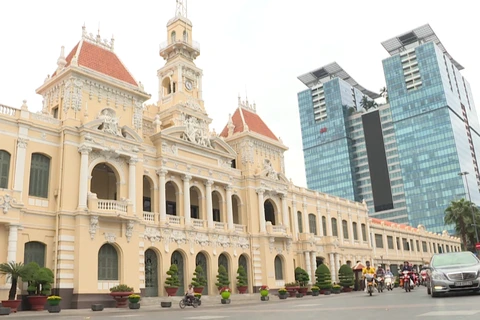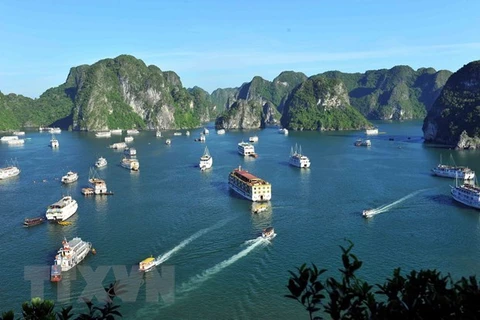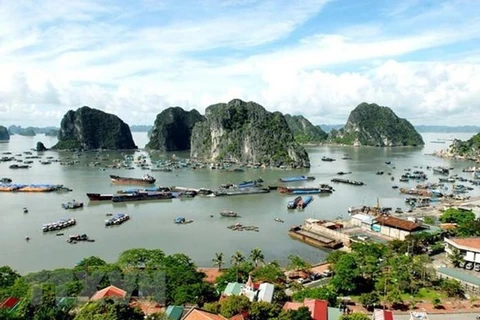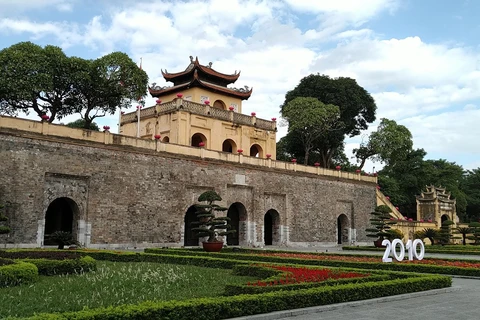Hanoi (VNA) – The Vietnam National Administration of Tourism (VNAT) and the Colombian Embassy in Vietnam on October 8 held a webinar discussing the role of central and local management agencies and enterprises in managing tourism at heritage sites.
The event, part of activities to realise the memorandum of understanding on tourism cooperation between the Vietnamese Ministry of Culture, Sports and Tourism and the Colombian Ministry of Commerce, Industry and Tourism, attracted the participation of hundreds of experts and delegates from the two countries.
They shared information, policies and experience in the role of central and local management agencies and businesses in tourism management at the UNESCO-recognised heritage sites, including Vietnam’s Trang An Landscape Complex – a World Cultural and Natural Heritage Site - in Ninh Binh province.
The delegates focused discussions on issues related to tourism management such as promoting the cultural and spiritual values of heritage sites, and preserving these values in a sustainable way.
Speaking at the webinar, deputy head of the VNAT Ha Van Sieu said that although the COVID-19 pandemic has had a heavy impact on the tourism industry, the world has the right to hope for the sector’s recovery and development in the near future.
This series of events will be the premise to clearly orient the recovery and development of the tourism industry of the two countries.
Director of the Ninh Binh Department of Tourism Bui Van Manh said that the title of world heritage has created an important highlight, making Ninh Binh a bright spot on the tourist map of Vietnam (top 10 localities with the highest number of visitors in Vietnam).
In order to actively respond to COVID-19 and prepare resources to develop tourism after the pandemic is put under control, the provincial Department of Tourism and the Management Board of the Trang An Landscape Complex have implemented many measures to stimulate tourism, including offering attractive products at preferential prices and ensuring service quality to attract domestic visitors.
The province is also developing new products to attract international tourists, especially those from regions that are not affected by the pandemic./.
The event, part of activities to realise the memorandum of understanding on tourism cooperation between the Vietnamese Ministry of Culture, Sports and Tourism and the Colombian Ministry of Commerce, Industry and Tourism, attracted the participation of hundreds of experts and delegates from the two countries.
They shared information, policies and experience in the role of central and local management agencies and businesses in tourism management at the UNESCO-recognised heritage sites, including Vietnam’s Trang An Landscape Complex – a World Cultural and Natural Heritage Site - in Ninh Binh province.
The delegates focused discussions on issues related to tourism management such as promoting the cultural and spiritual values of heritage sites, and preserving these values in a sustainable way.
Speaking at the webinar, deputy head of the VNAT Ha Van Sieu said that although the COVID-19 pandemic has had a heavy impact on the tourism industry, the world has the right to hope for the sector’s recovery and development in the near future.
This series of events will be the premise to clearly orient the recovery and development of the tourism industry of the two countries.
Director of the Ninh Binh Department of Tourism Bui Van Manh said that the title of world heritage has created an important highlight, making Ninh Binh a bright spot on the tourist map of Vietnam (top 10 localities with the highest number of visitors in Vietnam).
In order to actively respond to COVID-19 and prepare resources to develop tourism after the pandemic is put under control, the provincial Department of Tourism and the Management Board of the Trang An Landscape Complex have implemented many measures to stimulate tourism, including offering attractive products at preferential prices and ensuring service quality to attract domestic visitors.
The province is also developing new products to attract international tourists, especially those from regions that are not affected by the pandemic./.
VNA
























